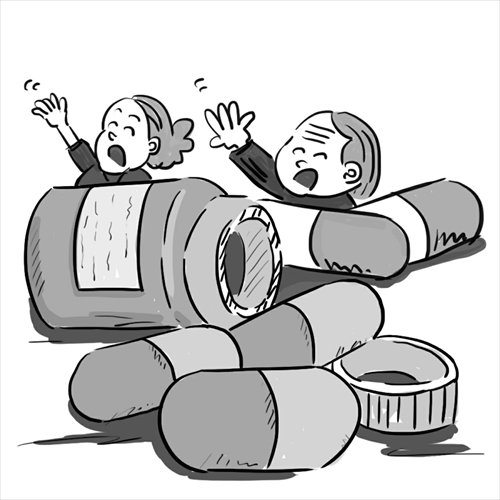
Illustrations: Chen Xia/GT
It all starts with a flyer in the mail box or an advertisement in a local newspaper claiming that senior citizens can get a free gift, like a wok or a quilt, if they arrive at the designated time and place.
With nothing else to do during the day, the elderly man or woman arrives at the venue and is greeted warmly by a team of young, honey-lipped "healthcare experts" who say that their free gift is waiting inside. Once in the room, they are told that all they have to do is sit through a lecture promoting one of their products.
During the lecture, the product is touted as a "medical breakthrough" and a "magic tonic" that can do wonders for old age. The elderly audience is assured that the price being offered to them is exclusive and their "very last chance," as the experts will soon leave for another city.
This may seem like a scene out of some 1800's-era traveling snake-oil salesman's tent, but in fact it happened just the other day, right here in modern Shanghai, when dozens of local seniors were conned into spending 6,999 ($1,078) each for a box of ordinary medicine that retails for only 120 yuan.
Some of the victims told media that although they regretted being cheated, they admitted that the salesmen treated them kindly, which they thought was worth the money they lost. As naive as that may sound, it points to a heartbreaking fact of life for China's rising ranks of senior citizens.
Though some Chinese elders live with their adult children, a larger number live alone or are left alone all day. As most young adults are consumed by careers and school-aged children spend their weekends at cram schools, being old can get quite lonely.
With nobody to spend time with, it's understandable that so many Chinese seniors seek companionship whenever and wherever they can find it. This makes them an easy target for conmen, who use smooth-talking sales pitches for faux health and longevity products.
Financial services fraud is also easy bait for China's elderly, who are tricked into handing over their retirement funds to these so-called investors. Xinhua News Agency recently reported that 9.9 billion yuan had been illicitly raised from thousands of naive seniors in Guangdong Province who were fooled by the scammer's fancy showroom exhibitions.
Seniors are a big market in China. There were 212 million Chinese aged over 60 in 2015, accounting for 16 percent of the nation's total population, official data showed. For scammers, all it takes is treating them nicer than their own adult children do and winning their trust in order to swindle seniors out of thousands and even millions from their "hidden-behind-the-walls" life savings.
Since there is no law in China against marking up a product's retail price 500 or even 5000 percent, the conmen can't be prosecuted. Ironically, it's usually the adult children of the victims who get angrier about the scam than the seniors themselves. But if these adults spent more time with their elderly parents, these lonely old people wouldn't be as susceptible to scams.
In Shanghai, the deputy mayor told media last year that the aging population in the city with a Shanghai hukou (resident's certificate) is predicted to reach 5.3 million by 2020. That makes Shanghai prime hunting grounds for conmen, who have full access to the city's newspapers as well as its mailboxes to send out ads and flyers for their scams.
There are already some government-backed efforts against Internet, telecom and mobile app scams, but oddly enough there really aren't any measures for more traditional media such as print media that are mostly read by seniors. Thus, what Shanghai needs are more official bulletins put out by district-level civil affairs departments to keep the city's elderly residents informed and updated. But until the droves of snake oil salesman who pass through Shanghai on a daily basis are finally penalized, they will continue to prey on our elderly.
The opinions expressed in this article are the author's own and do not necessarily reflect the views of the Global Times.

